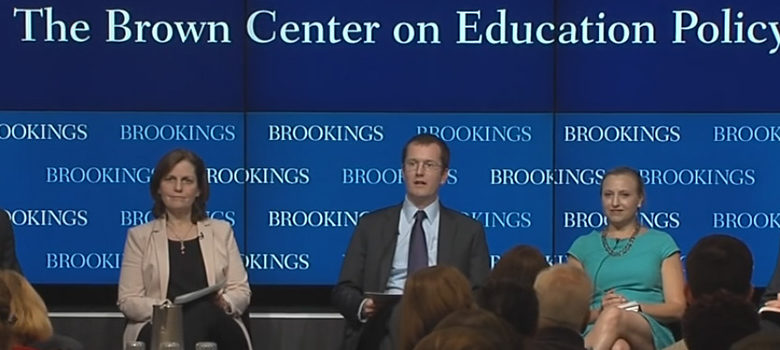
On 10 June, the Brookings Institute held a panel discussion focused on pending education legislation in Congress. The panelists, former House and Senate staffers who have worked directly on education legislation, candidly discussed the politics behind the reauthorization of education bills. Despite disagreeing over what will be needed to ensure reauthorization, all agreed that education has become a highly politicized issue in recent years.
Two of the most significant laws governing education — the Elementary and Secondary Education Act (ESEA) and the Higher Education Act (HEA) — are long overdue for reauthorization. These two laws are the source of most federal funding for U.S. K-12 schools and universities. The current polarized political climate in Washington makes it unclear if the 114th Congress will be successful in overhauling either of them.
The ESEA was last renewed in 2002 under the new name of No Child Left Behind and has been due for a rewrite since 2007. ESEA has been the center of the debate over standardized testing and federal education requirements. The Higher Education Act, last reauthorized in 2008, governs the administration of federal student aid programs, including Pell Grants and federal student loans.
Congress most recently attempted to reauthorize ESEA in 2011, when a rewrite of No Child Left Behind (NCLB) was passed by the Senate Health, Education, Labor, Pension (HELP) committee, but failed to move forward in the House. Bethany Little, former Chief Education Counsel for the HELP committee, cited a waiver program initiated by the Obama administration as taking momentum away from the bill. These waivers permit flexibility on how states may spend federal funds for school improvement efforts. By removing a major motivation for reforming NCLB, the waiver program weakened Congress’ resolve to reauthorize the law, accoring to Little.
Currently there is a renewed effort to overhaul ESEA. Support for a new bill appears to be bipartisan. On 16 April, the Senate HELP committee, led by Chairman Lamar Alexander (R-Tenn.) and Ranking Member Patty Murray (D-Wash.), unanimously passed the Every Child Achieves Act. Included in this act is mandatory annual statewide testing for all students, but without any federal accountability provisions defining what and who should be tested. Little thinks this may be a sticking point, as Civil Rights groups and many Democrats will not get on board with a bill that does not have specific subgroup accountability to protect consistently underserved students.
Originally the bill cut STEM programs, but thanks to an amendment from Sens. Franken (D-Minn.), Kirk (R-Ill.), and Murray, funding for the Math and Science Partnership (MSP) program to support professional development for Science and Math teachers was preserved. There are also a number of STEM-related amendments that will be introduced on the Senate floor, including a diversity measure introduced by Senator Kirsten Gillibrand (D-N.Y.), which would require states to report how proposed federal grant projects will increase access for students who are underrepresented in STEM fields. More divisive issues including federal protections from bullying for LGBT students and Title I portability were not considered in committee so as to allow the bill to proceed. These controversial provisions may come up on the floor of the Senate, slowing or halting passage of the bill.
In the House, education programs have taken a bigger hit. The House appropriations subcommittee for Labor, Health and Human Services (HHS), and Education released a proposed FY 2016 funding bill that would eliminate a total of twenty educational programs, including the Math and Science Partnership Program. House leaders argued that many of these programs were duplicative of existing programs that were already funded. Meanwhile, the Senate appropriations committee, which is scheduled to meet later this month, has traditionally supported the MSP program. Continued federal funding for the program looks promising. IEEE-USA strongly supports the MSP program.
Overall, the prognosis for ESEA is good. 2016 is an election year, and every legislator wants to be seen as supporting their local schools. Many of the more controversial provisions associated with the bill will likely be dropped so as to allow the bill to ultimately pass.
While reauthorization for ESEA looks promising, HEA comes with it a plethora of contentious issues. Many in the higher education community are concerned over provisions such as a college ratings system, state authorization, and definition of a “credit hour,” which they regard as executive overreach. The college rating system is designed to provide greater transparency into college funding, operations and outcomes, to help parents and students make better educational decisions.
Little notes that many of these provisions, including ratings, are supported by students and tax payers who want more transparency and accountability for their tuition and tax dollars. Universities, on the other hand, are less enthusiastic about outside interference with their institutions.
The HEA also adjusts the process for funding and administering federal grants and loans. Senator Alexander has made simplification of the grant and loan system a primary goal of the reauthorization effort. However, Sarah Flanagan, Vice President of the National Association of Independent Colleges and Universities is concerned that an attempt to simplify the daunting loan application process may in fact do the opposite.
The panel was in agreement that any overhaul of the Higher Education Act is unlikely to occur before the election in 2016. Director of the Federal Budget Project for the Education Policy Program, Jason Delisle, predicted that higher education will be a major issue going into the 2016 elections for potentially the first time ever. Flanagan agreed, noting that education is a top issue among highly sought after independent voters, which will push this issue into the forefront of public debate. It is worth noting, however, that education experts said the same thing in 2012.
IEEE-USA supports K-12 funding of STEM education programs and actively encourages Congress to protect these programs in the federal budget.






